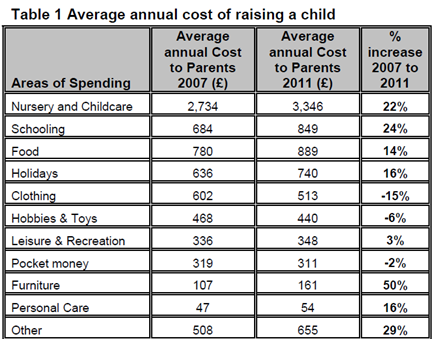Do headline figures on annual cost of raising a child tell the whole story?
Today this headline appeared in the Daily Mail:
"How raising a child up to the age of 11 costs more than £90,000: Average annual cost up 15% in five years."
The same story also appeared in other publications, including the Daily Star.
These figures come from the Halifax Cost of Children Review which released its latest findings this morning; drawing upon a wide variety of data sources to estimate the average cost of raising a child per year.
You don't have to delve too far into the review to find the figures that are used in the various naewspaper reports, coming as they do in Table 1:


According to these figures, the average annual cost to parents in 2011 (£8,307) is 15% larger than the average cost for 2007. Moreover, if we multiple £8,307 by 11 we get £91,377.
But should an increase in the cost come as a surprise?
In short, not really as it would appear Halifax's figures are not adjusted for inflation.
Notably, the press release points out that:
"Over the same period inflation, as measured by the Retail Price Index, rose by 18%."
With this in mind, the reported cash increase of 15 per cent is behind the rate of inflation and thus the real average annual costs of raising children have reduced over this period.
In fairness to the Mail, the article does point out that inflation rose by 18 per cent over this period and it also states that "spending on food and holidays fell in real terms" with, for example, the cost of food increasing by just 14 per cent in cash terms.
However, readers who only saw the headline or who don't have a full understanding of the difference between real terms and nominal increases might have been misled by the reported 'rise' in the headline.
What else can we say?
The Mail also quotes a Halifax economist as stating that the reported increase in the cost of child rearing "has added to the already considerable strain on household finances during the economic downturn."
Considering that we have learnt that the reported increase is in fact a decrease in real terms, have households not had something of a bonus?
Not necessarily, as a reduction of cost in real terms only results in rising living standards if accompanied by an increase in (or maintenance of) real household income. If real incomes fall faster than real prices then living standards decline.
In fact, there is evidence to suggest that Halifax's spokesperson may be on to something as recent data from the Institute for Fiscal Studies (IFS) suggests that real incomes have suffered in recent years.
The table below presents mean weekly income for UK households after housing costs (net of taxes) converted into 2010-11 prices using the ROSSI index:
|
Year |
Weekly household income |
|
2006/07 |
£463.57 |
|
2007/08 |
£471.83 |
|
2008/09 |
£469.86 |
|
2009/10 |
£474.68 |
|
2010/11 |
£443.34 |
Full Fact then converted the IFS's data into cash terms (using the deflators provided by the IFS) and the results are presented in the table below:
|
Year |
Weekly household income |
|
2006/07 |
£397.47 |
|
2007/08 |
£415.35 |
|
2008/09 |
£431.77 |
|
2009/10 |
£449.06 |
|
2010/11 |
£443.34 |
Looking at this data, we can see a reduction in weekly household income in real terms which might prevent households taking advantage of the real terms fall in the costs of child rearing.
Perhaps a little more interesting, in cash terms, weekly household income before housing costs increased by just 10.4 per cent (11.5 per cent after housing costs) between 2006/07 and 2010/11 and thus the cash costs of child rearing increased by a greater degree (15 per cent).
It must be stressed that this analysis is limited by methodological differences between the IFS's and Halifax's figures: In particular, the IFS figures refer to the financial year while Halifax uses a calendar year. However, it does shed some light on the relative burden that raising a child has placed on household incomes over the period.
Were the figures on child rearing costs reliable to begin with?
Unfortunately we haven't yet been provided with a copy of the report in question by the Halifax, so we don't know how the findings themselves have been arrived at. This makes it difficult for us and the public to place much confidence in them.
However, the Halifax's press release does point towards one potential caveat:
"This report is prepared from information that we believe is collated with care, however, it is only intended to highlight issues and it is not intended to be comprehensive. We reserve the right to vary our methodology and to edit or discontinue/withdraw this, or any other report."
While it is common to extrapolate findings from a sample, we do hope that any possible methodological changes alluded to hear are fully explained by the bank, as these could have a profound effect on the results when making the sort of comparisons over time that both the Mail and the Star have chosen to lead with.
Update (5 September 2012)
Further research on the cost of raising a child was published yesterday by the Child Poverty Action Group which estimates a total cost of £143,000 to bring up a child to the age of 18, the equivalent of £150 a week.